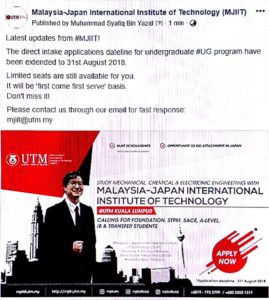


https://www.thestar.com.my/lifestyle/health/2020/03/16/individual-action-more-important-than-government-action-in-covid-19#cxrecs_s

How individuals respond to government advice on preventing the spread of Covid-19 will be at least as important, if not more so, than government action.This is according to a commentary published in The Lancet journal on March 9 (2020) from researchers at the University of Oxford and Imperial College London in the United Kingdom, and Utrecht University and the National Institute for Public Health and the Environment in the Netherlands.
Professor Deirdre Hollingsworth from Oxford’s Big Data Institute said: “Completely preventing infection and mortality is not possible, so this is about mitigation.“Our knowledge and understanding of Covid-19 will change over time, as will the response.“High quality data collection and analysis will form an essential part of the control effort.“Government communication strategies to keep the public informed will be absolutely vital.”Social distancing is currently the most important measure, with an individual’s behaviour key.This includes early self-isolation and quarantine, seeking remote medical advice, and not attending large gatherings or going to crowded places.
The virus seems to largely affect older people and those with existing medical conditions, so targeted social distancing may be most effective.Government actions will be important, including banning large events such as football matches; closing workplaces and schools where Covid-19 has been identified; and making sure that good diagnostic facilities and remotely-accessed advice, like telephone helplines, are widely available.Ensuring the provision of specialist healthcare is also vital.The researchers warn, however, that large-scale measures may only be of limited effect without individual responsibility.
All measures, of course, will have an economic impact, and some stricter measures, such as shutting down entire cities as seen in Wuhan, China, may be less effective in Western democracies.The aim of these measures is to slow the spread of the virus and avoiding a huge peak in the number of new infections.This can avoid overwhelming health services, keep the impact on the economy to within manageable levels, and effectively buy more time to develop and manufacture effective vaccines and treatments.
Imperial College’s Prof Sir Roy Anderson said: “Governments need to decide on the main objectives of mitigation: is it minimising morbidity and associated mortality, avoiding an epidemic peak that overwhelms healthcare services, keeping the effects on the economy within manageable levels, or flattening the epidemic curve to wait for vaccine development and manufacture on scale and antiviral drug therapies? “We point out they cannot achieve all of these, so choices must be made.”The researchers highlight that wider support for healthcare services and workers is vital.
Containing the spread of an infectious disease relies on keeping the reproduction number (R0) – the number of people infected by each infected person – below 1, where the pathogen will eventually die out.If R0 rises above 1, i.e. each infected person infects more than one other person, the pathogen will spread.Early data from China suggests that the R0 for Covid-19 could be as high as 2.5, implying that in an uncontained outbreak, 60% of the population could be infected.However, with Covid-19, it is not currently clear how long it takes for an infected person to become infectious to others, the duration of infectiousness, the fatality rate, and whether and for how long people are infectious before symptoms appear.It is also not currently clear if there are cases without symptoms.
It currently seems likely that the pandemic will spread more slowly than seasonal influenza and SARS (severe acute respiratory syndrome), but last longer, which has economic implications.Seasonal influenza is generally limited by warmer weather, but it is not known if this is the same for Covid-19, so monitoring is needed.Ongoing clinical research into treating seriously ill patients is also necessary.One of the main priorities for researchers and policymakers will be contact tracing, with models suggesting that 70% of people an individual has come into contact with will need to be traced to control the early spread of the disease.
The authors say other priorities include shortening the time from symptom onset to isolation, supporting home treatment and diagnosis, and developing strategies to deal with the economic consequences of extended absence from work.Prof Hans Heesterbeek from Utrecht’s Department of Population Health Sciences said: “Social distancing measures are societally and economically disruptive, and a balance has to be sought in how long they can be held in place.“The models show that stopping measures after a few months could lead to a new peak later in the year.“It would be good to investigate this further.”










